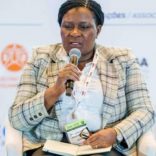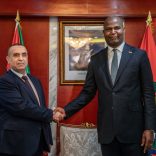Kenmare’s new dredgers en route to Mozambique
AfDB partners argue that investment in Mozambique’s ENH is “transparent”

File photo: Lusa
A Mozambican company’s first foray into international markets faces some hindrance due to the recent ‘undisclosed debts’, but the AfDB seems enthusiastic about the investment opportunity.
African Development Bank (AfDB) partners on Wednesday supported “transparent” US$1.3 billion (€1.1 billion) funding for the liquefied natural gas project in northern Mozambique.
For the first time, a Mozambican state-owned company – the National Hydrocarbon Company (ENH) – turned to international financial markets on Monday following the country’s sovereign debt restructuring agreed with investors in October and ratings agency Fitch removing the country from its sovereign default list.
In addition to the hidden debts amounting to more than US$2 billion (1.8 billion Euros), under the investigation into which former finance minister Manuel Chang is being held in South Africa at the request of US justice authorities, state-owned Mozambique Electricity (EDM) owes R221 million (€13.4 million) to its South African counterpart Eskom, South Africa’s Public Enterprises Minister Pravin Gordhan announced recently.
Asked why the AfDB intends to lend 30% of US$1.3 billion to the Mozambican state given this situation, Akinwumi Adesina, said that this was a “fantastic” investment opportunity.
“The projects are well structured. I am a father, and in life we learn from mistakes. A mistake is a disaster only when nothing is learned, and I think Mozambique has learned some of the lessons and I have great confidence in Mozambique,” the AfDB president told Lusa.
“The country’s economy is performing well,” Adesina added, and Mozambique has just “carried out a magnificent electoral process, and is moving forward with IMF [International Monetary Fund] programs.”
“We want them to be in a position to make money, manage their funds well, pay off part of their debt and be a resilient economy. Our approach is not punitive,” he said.
The African banker said the transaction was transparent, and “the fact that global investors are investing their money means they believe in the business and in Mozambique.”
The AfDB president, however, has failed to detail to what extent the Government of Mozambique will ensure the protection of private investments in natural gas projects in the Rovuma basin in northern Mozambique.
TBD [Eastern and Southern African Trade and Development Bank]
“In the experience of TBD [Eastern and Southern African Trade and Development Bank], which had the privilege of granting US$100 million [€90.7 million] to the liquefied natural gas project in Mozambique, what gave us confidence was the fact that it is an export-oriented project where much of the liquefied natural gas will go to Japan and other countries,” Adamassu Tadesse, president of the Mauritius-based banking institution, noted.
Development Bank of Southern Africa
South African Zodwa Mbele, head of transactions for the Johannesburg-based Development Bank of Southern Africa declined to comment on the hidden debt dispute, but noted that the natural gas project is “a transformative project that will change the landscape of Mozambique’s economy, and it is therefore necessary to raise the debate beyond transactions [loan repayments] and look at the benefits to the country’s economy.”
“Besides, the most important thing is that it’s a government project where the government has its own “skin” [investment], and for whom the success of the project is equally important,” he said.
Africa50
Alain Ebobissé director general of Africa50, an institution based in Casablanca, Morocco, explained that they were not investing in the Mozambique project themselves, but commented that African institutions “choose higher risks” because “they do not always feel the need to wait for the perfect scenario to invest.”
Ebobissé stressed that “the best bets” are made when there is risk, “and the possibility of litigation must be prepared [for]”.
Africa Finance Corporation
Sanjeev Gupta of the Dubai-based Africa Finance Corporation, added: “We believe there is a risk, but it is not a coincidence that the default level of projects in Africa is one of the lowest, and this is because we take mitigating risk very seriously.”
“Unfortunately for us, the African continent is not a game of asset allocation. It is our game, our life, whereas you [Europeans] have the privilege of being choosy,” the African investor replied when asked by Lusa about the security of private investment in Africa.












Leave a Reply
1 Comment on "AfDB partners argue that investment in Mozambique’s ENH is “transparent”"
You must be logged in to post a comment.
You must be logged in to post a comment.
Let’s hope that Mr Akinwumi Adesina has a similar “sure footed” judgement on the ENH credit risk as for his judgement on a “magnificent electoral process”. The difference being that the big boys will bail out ENH out at a punitive price whereas for the ordinary citizen he will be waiting to see any benefit of the “country’s economy [which] is performing well”. Mr Akinwumi Adesina should maybe walk the streets and see where the benefits of this wonderful economy are being felt!